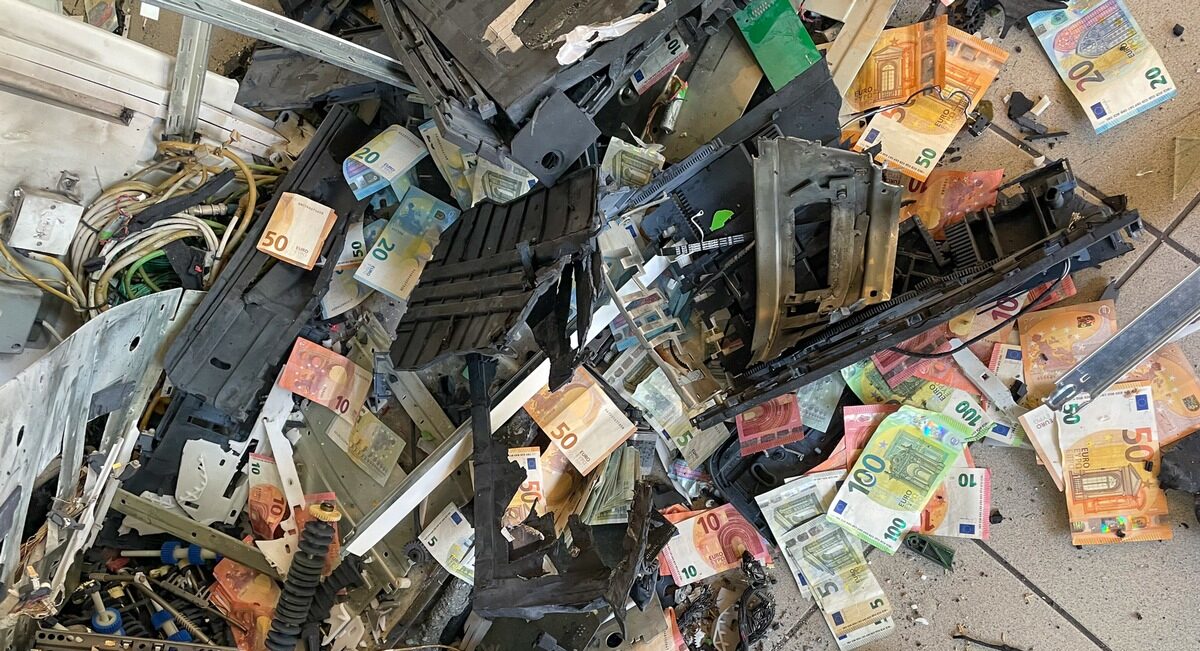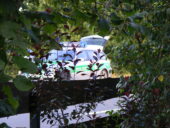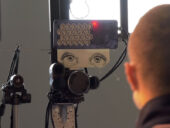The number of blown-up self-service kiosks at banks continues to increase. Instead of inflammable gas, solid explosives are often used, which also increases the damage to property. These crimes are particularly lucrative in Germany. Interior ministers now call for laws for operators of ATMs.
Bank robberies in the style of the Red Army Faction are history, today’s expropriations of cash mainly target ATMs. The perpetrators operate in a highly brutal manner: Whereas in the beginning gas was introduced into the self-service kiosks and ignited, now explosives with black powder from New Year’s Eve firecrackers are used. Sometimes the perpetrators first blow up the housing of the ATM and then place a second explosive device on top of its safe. With this new method, the property damage in the branches increases considerably, and it also puts residents in bank buildings in mortal danger. Bavarian Justice Minister Georg Eisenreich (CSU) calls this “bank robbery of the modern age”.
Several state interior ministers are now calling for a law to better secure ATMs. In an interview with the “Handelsblatt”, the Federal Minister of the Interior, Nancy Faeser (SPD), also threatened on Tuesday to impose obligations on the operators. The pressure to act is great: In March, the Federal Ministry of the Interior described the number of cases of ATM burglaries for the past year as “again worrying”. With 496 offences, the year 2022 recorded a new high, compared to 2021, an increase of 27 per cent.
However, the authorities also report successes against the perpetrators known as the “Audi gang” because of their high-powered vehicles. At the end of January, state criminal investigation offices, together with Dutch investigators, executed ten arrest warrants in the border region with North Rhine-Westphalia; those arrested are said to be responsible for around one hundred offences in nine German states. A similar sweep with dozens of arrests was achieved by investigators from seven federal states in mid-March.
Many blasts are said to have been committed by “travelling perpetrators from Eastern Europe”; according to investigators, they allegedly come from Poland, Romania and Moldova. Most of the suspects, however, flee to the Netherlands, where a vending machine blasting scene consisting of several hundred people is said to have emerged. However, these delinquents, called “Plofkrakers”, hardly ever strike in the neighbouring country any more, because Dutch banks have introduced various security measures, including rendering cash unusable after a strong shock with paint or glue. In addition, the machines are loaded with less cash, so that it is less profitable to blow them up. In Germany, on the other hand, the institutions deposit large sums of money in the machines; on average, the perpetrators get away with more than €100,000.
Blown-up ATMs are a problem especially in the federal states bordering the Netherlands, North Rhine-Westphalia and Lower Saxony – according to their criminal investigation offices, the two states accounted for about half of the nationwide cases. Banks with good motorway connections are particularly affected.
In Germany, too, ATMs are to be better secured. In November, the Federal Ministry of the Interior had invited to a first nationwide round table. Participants included the credit and insurance industries, the Bundesbank, the Federal Criminal Police Office, the Federal Police and the police forces of the federal states. According to a joint declaration, more branches are to be locked at night, and the voluntary introduction of colouring or sticking systems was also agreed upon. The introduction of these systems is comparatively cheap, as reported recently by “Der Spiegel”. A maximum of €2,500 per vending machine would be spent on dyeing technology, adhesive technology would cost a maximum of €3,000.
The Conference of Interior Ministers demands a report from the Federal Ministry of the Interior this month on the implementation of the measures. If this report shows that the proposed measures are ineffective, legal obligations for manufacturers and operators of ATMs would have to follow, the ministers demand. This is also the view of the Federal Minister of the Interior: “Now it is the responsibility of the banking industry to implement these measures quickly and consistently,” Faeser told the “Handelsblatt”. There are to be further talks with the banks at the federal level by June at the latest. However, Germany is probably still far from the conditions in the Netherlands. In 2019, 71 cases were still registered there, in 2022 there were only nine.
Published in German in „nd“.
Image: Crime scene after ATM bombing (Baden-Württemberg State Criminal Police Office).





Leave a Reply